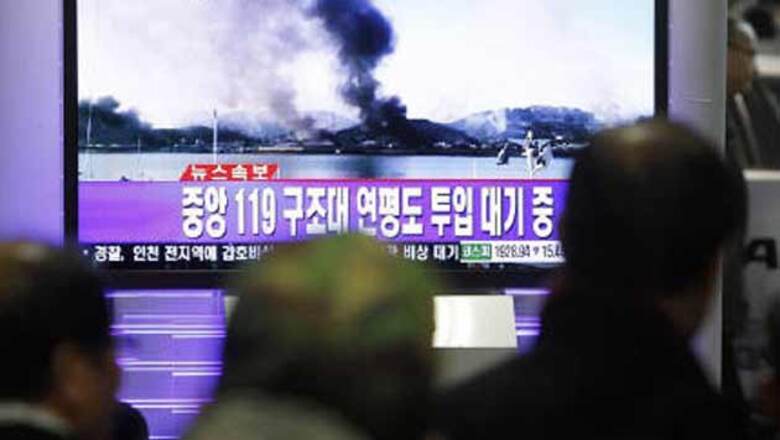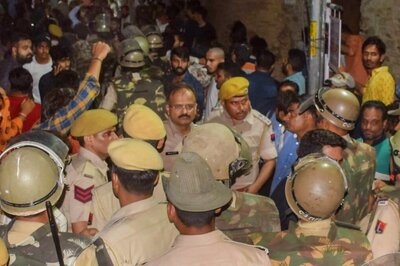
views
Incheon, South Korea: South Korea warned North Korea of "enormous retaliation" if it took more aggressive steps after Pyongyang fired scores of artillery shells at a South Korean island in one of the heaviest attacks on its neighbour since the Korean War ended in 1953.
And a senior finance official told an emergency meeting that South Korea's economy, Asia's fourth largest, could withstand any shock linked to the attack. Measures would be taken if needed, Vice-Finance Minister Yim jong-yong said.
Officials said they expected the impact on markets to be temporary and analysts agreed on grounds that similar bouts of conflict with North Korea, albeit less dramatic that Tuesday's attack, had had limited effect.
Korean stocks opened down 2.3 per cent in early trading and the Korean won sank 3.2 per cent against the dollar.
US President Barack Obama, interviewed by ABC news, reaffirmed Washington's commitment to defend South Korea - there are 28,000 US troops in the country - and said he would consult with its president before considering any action.
Obama said he would tell China, the only country close to an ally to the reclusive North that it must tell Pyongyang that "there are a set of international rules they must abide by."
The South fired back after Tuesday's attack and sent fighter jets to the area, near a disputed maritime border on the west of the divided Korean peninsula and the scene of deadly clashes between the two rivals in the past.
South Korea was conducting military drills in the area at the time but said it had not been firing at the North, which recently revealed a major new aspect to its nuclear programme.
Pyongyang said Seoul started the fight, which killed two South Korean soldiers and wounded 17 others and three civilians while sending tremors through world markets already unsettled by Ireland's debt woes and a shift to less risky assets.
Calling the incident "an invasion of South Korean territory," South Korean President Lee Myung-bak warned that future provocations could be met with a strong response, although there was no indication of immediate retaliation.
"I think enormous retaliation is going to be necessary to make North Korea incapable of provoking us again," Lee said in a visit to military headquarters in Seoul. In another gesture, he met with security officials in a bunker at the presidential complex.
Vice-Finance Minister Yim told senior officials: "With its solid recovery pace, high foreign reserves, strong current account balance and high investors' trust, our economy has sufficient capacity to absorb any outside shock."
South Korea's national police agency raised the alert level to the second highest in 11 cities and counties near the border requiring half of all police to remain on emergency standby.
The United States condemned the attack, but said it was too soon to discuss how the US military might seek to deter the impoverished North from another strike and stressed that it was looking for a measured response.
The US and South Korean defense chiefs agreed to coordinate any response, the Pentagon said.
UN Secretary General Ban Ki-moon, a former South Korean foreign minister, also condemned the attack but urged restraint and dialogue between the two sides.
China was careful to avoid taking sides, calling on both Koreas to "do more to contribute to peace."
Adding to tension
Analysts said they saw little chance of the United States rushing to resume so-called six-party talks on North Korea's nuclear programmes.
The incident followed revelations over the weekend that Pyongyang was fast developing another source of material to make atomic bombs, and analysts said the North may again be pursuing a strategy of calculated provocations to wrest diplomatic and economic concessions from the international community.
It also follows moves by leader Kim Jong-il to make his untested youngest son his heir apparent, leading some analysts to suggest the shelling may partly have been aimed at burnishing the ruling family's image with the military.
The South Korean military estimated some 100 shells landed on and near Yeonpyeong island, which lies off the west coast of the peninsula. It returned fire with 80 of its own shells.
Photographs from the island, 120 km (75 miles) west of Seoul, showed smoke rising from buildings. "Houses and mountains are on fire and people are evacuating. You can't see very well because of plumes of smoke," a witness on the island told YTN Television.
Experts say North Korea's Kim has for decades played a carefully calibrated game of provocation to squeeze concessions from the international community and impress his own military. The risk is that the leadership transition has upset this balance and that events spin out of control.
South Korea's Lee said attacking civilians was unforgivable and further aggression would be severely punished. "Our military should show this through action rather than an administrative response," said Lee, who was due to discuss the incident with Obama by telephone. But Lee made no suggestion the South would retaliate further, suggesting Seoul was taking a measured response.
North Korea, for its part, kept up the bellicose rhetoric, warning in a military communique of "merciless counter-actions" if South Korean forces violate any of its territory.
Unresolved war
The North has a huge array of artillery pointed at Seoul that could decimate an urban area home to around 25 million people and cause major damage to its trillion-dollar economy.
The two Koreas are still technically at war -- the Korean War ended only with a truce -- and tension rose sharply early this year after Seoul accused the North of torpedoing one of its navy vessels, killing 46 sailors.
North Korea, which has often decried joint US-South Korean military exercises, blamed its wealthy neighbor. "Despite our repeated warnings, South Korea fired dozens of shells from 1 p.m. ... and we've taken strong military action immediately," its KCNA news agency said in a brief statement.
South Korea said it had been conducting military drills in the area beforehand but had fired west, not north.
The White House said Obama was "outraged" by the incident, which looked likely to complicate Washington's campaign to persuade Pyongyang to abandon its nuclear programmes.
"North Korea has a pattern of doing things that are provocative. This is a particularly outrageous act," said White House spokesman Bill Burton.
The Pentagon said no immediate action was planned.
"I wouldn't say we're looking at anything in particular at this point," said Colonel Dave Lapan, a Pentagon spokesman.
The attack highlighted the limits of US leverage with North Korea and China, with some Republican lawmakers calling for more forceful response.
"Maybe this attack will wake up American diplomats addicted to soft-line diplomacy," Republican Congressman Ed Royce said in a statement.
With US troops in South Korea, the two nations' combined forces face an estimated 1 million North Korean soldiers in one of the world's biggest standing armies.
At the United Nations, Security Council diplomats said discussions were under way over how to take up the issue, but North Korea's envoy said council had no business discussing what he called an "inter-Korean" matter.
Russian Foreign Minister Sergei Lavrov called the escalation in tensions a "colossal danger."
Markets shudder
News of the exchange of fire depressed the won in offshore markets with the 1-month won down about four percent at one stage in NDF trading. US 10-year Treasury yields fell and gold rose as investors shifted to safe-haven assets.
In New York, major US stock market indexes closed more than 1 per cent lower as the tensions on the Korean peninsula added to worries about global economic conditions.



















Comments
0 comment